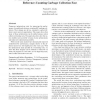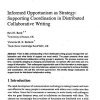109 search results - page 12 / 22 » How to Make ad-hoc Polymorphism Less ad-hoc |
128
click to vote
HICSS
2005
IEEE
15 years 7 months ago
2005
IEEE
E-learning growth is driven by global, societal, and technological changes that both enable and require increased worker and learner mobility, access to distributed domain experti...
85
Voted
EICS
2010
ACM
15 years 7 months ago
2010
ACM
In Human Computer Interaction, plasticity refers to the capacity of User Interfaces (UIs) to withstand variations of context of use while preserving quality in use. Frequently, in...
110
click to vote
IWMM
2007
Springer
15 years 8 months ago
2007
Springer
Numerous optimizations exist for improving the performance of nondeferred reference-counting (RC) garbage collection. Their designs are ad hoc, intended to exploit different count...
IEEEARES
2008
IEEE
15 years 8 months ago
2008
IEEE
Mobile Ad hoc Networks (MANETs) rely on dynamic configuration decisions to efficiently operate in a rapidly changing environment of limited resources. The ability of a MANET to ma...
134
click to vote
ECSCW
1993
15 years 3 months ago
1993
Abstract: There is little understanding of how distributed writing groups manage their collaboration and what kinds of support are most useful. The paper presents three case studie...


